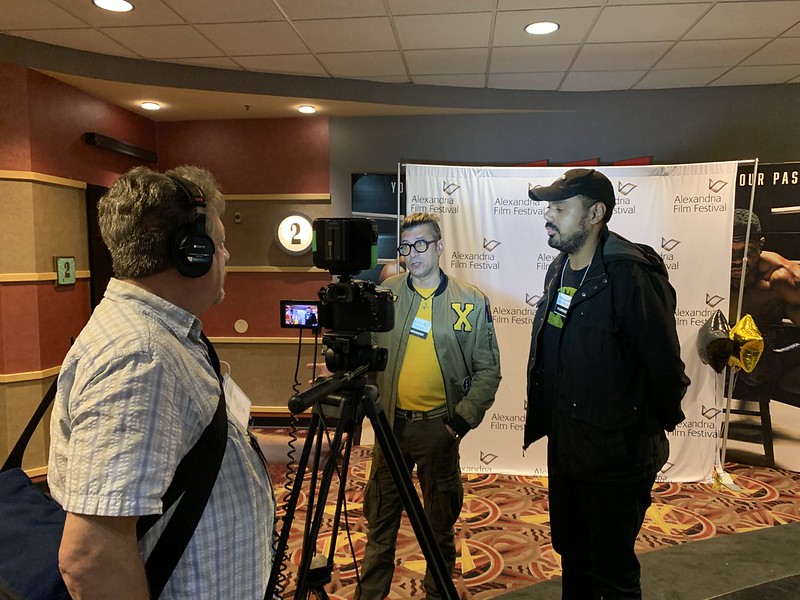The Alexandria Film Festival celebrates its 18th year Nov. 7-10. This is the second in an occasional series focusing on the history of the film festival, behind the scenes with the filmmakers and the movers and shakers that make it happen.
This is the second in an occasional series focusing on the history of the film festival, behind the scenes with the filmmakers and the movers and shakers that make it happen.
Questions for Jill Ray, documentary filmmaker and Vice Chair of the Alexandria Film Festival Board.
Q. What is your film background?
Jill Ray: I am a documentary filmmaker and had several films in the Alexandria Film Festival in 2010-11. In 2016 they asked me to join the Alexandria Film Festival Board. I was in film school at the time at American University and made my most significant film at that time, “The Courage of Her Convictions,” which was for my thesis project. It was a 17-minute documentary about a female private investigator, a real life person, who was working to exonerate men from life sentences who had proclaimed their innocence. It was a portrait of a person whose work complimented her passion on social justice issues. I did several other films including “In the Image of God,” about Dawnielle Miller who worked to empower low-income children in an Alexandria neighborhood and another about the underground illegal movement to keep chickens in Alexandria. In 2012, I was part of a team that created a 30-minute documentary for Maryland Public Television titled "Menhaden: The Most Important Fish in the Bay." It ended up winning three regional Emmys (student division) and a Cine Golden Eagle. I was lead producer, writer and narrator.
Q. What was the most difficult thing about making “The Courage of Her Convictions?”
Ray: This film took the most time and money. The most difficult thing was getting the convicts and convincing a number of the witnesses to the murder in New Orleans to come forward and be on camera to testify to what they saw. A private investigator found these people after a murder committed in the 80s, and it was a struggle to get all of these people to New Orleans for a reunion. We got access to the Louisiana State penitentiary but no cameras were allowed. The logistics were difficult. I wanted an all female crew and got it. Making films is a labor of love.
Q. Describe the film festival.
Ray: Our Festival attracts many social justice films — immigration, sex discrimination and also international films. We don’t get a lot of horror films even though Alexandria is a ghost town. On the Friday date the films at Beatley will be free programming for students and family friendly. Film festivals still struggle to attract younger audiences — they watch films on their phones. We try to come up with ideas like partnering with Patagonia who retained their theatre in the building when they opened their store. We do pop-up films there focusing on things like the environment, climate themes to attract a younger crowd and have partnerships with the city high school to mentor students. It has worked pretty well.
Q. What is your budget and how do you fund it?
Ray: This year’s budget is between $43-45,000. We apply for grants and this year got $11,000 from the Alexandria Commission for the Arts. We also get individual contributions and corporate sponsors. Each year it’s pounding the pavement to get what we need to support it. The staff are all volunteer positions.
Q. Where are you now in the process of putting together the Festival?
Ray: Submissions were accepted from March 4-July 31 so now we have begun the selection process. We have 12 volunteer judges this year who will rate the films using a number of criteria including originality/creativity, direction, writing, cinematography and structure. Over the years the judges have ranged in age from 19 to 78 years.
We received over 100 submissions and will choose around 60. As in the past years, we are documentary heavy but plan to offer a diversity/variety of genres come November to also include horror, comedy, thriller, and family—shorts and features.
Before Covid, we would receive up to 400 submissions but when Covid hit everything went dark. We’ve had to build back up again. We will probably have the three same locations again—Beatley Library, the Lyceum and AMC Hoffman. We are looking at another location for a special event this year focusing on James Baldwin. We select types of genres and sort by length and themes and complete the programs with some curated films that have been in other film festivals but haven’t hit the theaters yet. Sometimes we’re able to negotiate the contracts with the producers and it doesn’t cost us to show the film.
We have so far sent out 18 early acceptance notices and will notify all filmmakers of their acceptance or rejection by early September. Then we will release the schedule to the public.
